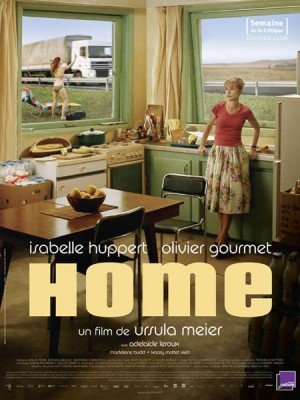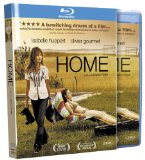| Reviews & Columns |
|
Reviews DVD TV on DVD Blu-ray 4K UHD International DVDs In Theaters Reviews by Studio Video Games Features Collector Series DVDs Easter Egg Database Interviews DVD Talk Radio Feature Articles Columns Anime Talk DVD Savant Horror DVDs The M.O.D. Squad Art House HD Talk Silent DVD
|
DVD Talk Forum |
|
|
| Resources |
|
DVD Price Search Customer Service #'s RCE Info Links |
|
Columns
|
|
|
Home
This, as it happens, is also the premise of director Ursula Meier's feature debut, Home (2008), Switzerland's official entry for Best Foreign Language Film at the 82nd Academy Awards. Actually, the film is the product of nearly two-dozen production companies spread across Switzerland, France, and Belgium (including the Tax Shelter of the Belgian Federal Government, a name singularly lacking in pizzazz).
The result are horrifying, insightful, and darkly funny if somewhat obvious, depressing, and debatably overblown by the end, but the high-def presentation is excellent and the disc includes a couple of well-chosen extra features.
The premise is simple enough. A family of five - mother Marthe (Isabelle Huppert), father Michel (Olivier Gourmet), rebellious teenager Judith (Adélaïde Leroux), smart but less confident and anxiety-prone younger daughter Marion (Madeleine Budd), and physically active youngest sibling Julien (Kacey Mottet Klein) - enjoy an unusual but blissful life in a secluded rural area. (Though a Swiss film the surrounding terrain is nearly as flat and featureless as Kansas. Turns out it was actually filmed in Bulgaria.) They do everything together as one big happy family: watch TV under the stars, bathe en masse, eat together, and play street hockey and football (soccer) on the crumbling, unused stretch of highway running a few meters in front of their house. Plans to open the highway were put on indefinite hold 10 years before.
But soon after the film begins, Julien spots construction vehicles, like an invading army of Once-lers*, laying stinky asphalt down the road a stretch, and he and his friends play in some sticky warm tar. Guardrails spring up like the Berlin Wall, isolating the family from their distant neighbors. Then on the radio the family learns the highway is to open after all, and bit-by-bit their happy lives are ruined despite every reasonable and unreasonable effort to preserve it.
For starters, they can no longer cross the highway safely. The family cat is tied up, while the humans are forced to walk to a distant drainage tunnel and like rats scurry through to reach the other side. That's where Michel's Volvo is parked, and the kids' school is on the opposite side, too. In one scene Michel, who has bought a large freezer for his family, tries to sneak it across the highway late one night, but this proves comically difficult, like Laurel & Hardy's efforts to move a player piano in The Music Box. Judith is a chain-smoking sun-worshipper but can no longer sunbathe because passersby noisily honk their horns and shout cheeky remarks at the bikini-clad teen. Judith, meanwhile, monitors the growing levels of that CO2 sticking to the grass near the highway and takes to wearing HAZMAT gear around the home.
And then there's the noise, the all-consuming, never-ceasing roar of passing vehicles. Marthe, who digs her feet in, refusing to move away, becomes obsessed with soundproofing her home, leading to extreme and bizarre behavior. As congestion on the highway builds, huge jams bring traffic to a halt which makes things even worse: now rubberneckers thoughtlessly peer into the family's once secluded home like tourists gazing at fish in a huge aquarium.
Home (also the French title) is darkly funny much of the time - for instance, the radio they listen to throughout the film amusingly broadcasts nothing but breathlessly delivered traffic reports. But mostly it's depressing because it's so painful to watch this likeable family's lives destroyed by events they cannot control, a highway that brings them only misery and which, as made clear by the end, does nothing to ease traffic problems in its commuter society.
The screenplay, by Meier, Antoine Jaccoud, and Raphaelle Valbrune, plays out its simple premise one step at a time, thoroughly and cleverly if also somewhat predictably. The extreme measures prompted by Marthe's growing psychosis aren't really believable by the end, but not entirely unreasonable given the film's fable-like approach.
Video & Audio
Shot on 35mm film and presented in its original 1.85:1 theatrical aspect ratio, Home is given a clean, 1920 x 1080p presentation showing the feature to best advantage. In high-def star Huppert, then 55 years old, is one of those women who only seems to improve with age, and the transfer reveals more of her incredibly expressive features, particularly her eyes, and also the texture of her freckly skin. The optional English subtitles accompanying the French-only Dolby Digital stereo audio are fine while the audio, with its growing, relentless traffic sounds contrasting the family's eclectic musical tastes (from classic Jazz to heavy metal) is mixed to current standards.
Extra Features
Extras include an intelligent, 32 1/2-minute interview with director Meier and cinematographer Agnès Godard about the film, its technical challenges, its inspirations, etc. Sleepless (1999), a 33 1/2-minute short featuring some stylistically similar concerns, is presented in 1.37:1 pillarboxed widescreen, and in standard-def. In high-def is a trailer and modest still gallery.
Parting Thoughts
Though it falls well short of greatness, Home is an interesting, original work, a modern fable about so-called progress's destructive impact on an otherwise perfectly content family. Recommended.
* A reference to Dr. Seuss's great children's book The Lorax, which this in some ways resembles.
Stuart Galbraith IV's latest audio commentary, for AnimEigo's Musashi Miyamoto DVD boxed set, is on sale now.
|
| Popular Reviews |
| Sponsored Links |
|
|
| Sponsored Links |
|
|
| Release List | Reviews | Shop | Newsletter | Forum | DVD Giveaways | Blu-Ray | Advertise |
|
Copyright 2024 DVDTalk.com All Rights Reserved. Legal Info, Privacy Policy, Terms of Use,
Manage Preferences,
Your Privacy Choices | |||||||














